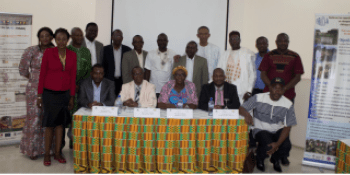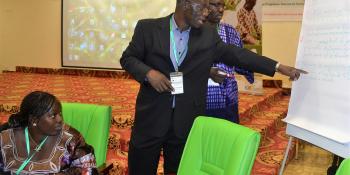African Group of Negotiators play major role in agricultural negotiations at COP18

Summary
The research was led by CCAFS East Africa and was implemented in collaboration with the International Livestock Research Institute (ILR).
COP17 in Durban gave agriculture a foothold within the United Nations Framework Convention on Climate Change (UNFCCC) negotiations, particularly through its Subsidiary Body for Scientific and Technological Advice (SBSTA). Building on this momentum, CCAFS East Africa helped create cohesion within the African Group of Negotiators (AGN) in order to facilitate a common position on agriculture within the negotiation process. In partnership with the African Climate Policy Centre (ACPC), the Common Market for Eastern and Southern Africa (COMESA), and the East African Community (EAC), CCAFS East Africa organized several post-Durban workshops to help articulate the African position and enhance capacity of the African Group of Negotiators.
A series of meetings, workshops and briefs during 2011-2012 built awareness and understanding of the complex relationships between climate change and the agricultural sector.
Activities included:
- Meetings with regional partners
- Post-Durban workshops and a Doha preparatory meeting with the AGN
- Production of a synthesis report on agricultural issues to SBSTA 36
- Breakfast meetings for the AGN across 2011-2012
- Party membership to the Kenyan COP18 delegation
As a result of the efforts with the AGN, African countries made joint submissions regarding agriculture to the UNFCCC for the first time, and gained a stronger voice within both SBSTA and UNFCCC processes. A clear African position has emerged, arguing for the inclusion of agriculture within international agreements on climate change, as well as providing African countries access to research, technology and opportunities to adapt to climate change while achieving mitigation co-benefits.
Key facts
- A clear position for the African negotiators within the UNFCCC process has emerged, focused on the inclusion of agriculture within a climate change agreement.
- African negotiators argue that African countries must be provided with access to research, technology for adaptation to climate change, while building mitigation co-benefits.
Lessons: key elements of success
- Establishing a common, science-based position for the African negotiators strengthens their position within the UNFCCC process.
- Partnerships with ACPC, EAC and COMESA enabled science-policy dialogue.
- The combination of meetings, workshops and briefing papers created awareness and understanding of issues related to climate change and agriculture.
Further reading
- The elephant in the room: Agriculture at the UNFCCC negotiations
- Push for agriculture within climate discussions in East Africa continues
Related research outputs
- Thornton P, Vermeulen S, Zougmoré R, Kinyangi J, Kristjanson P. 2012. Climate change, agriculture and food security: linking research and action in East and West Africa. Clivar Exchanges 60:29-30.


